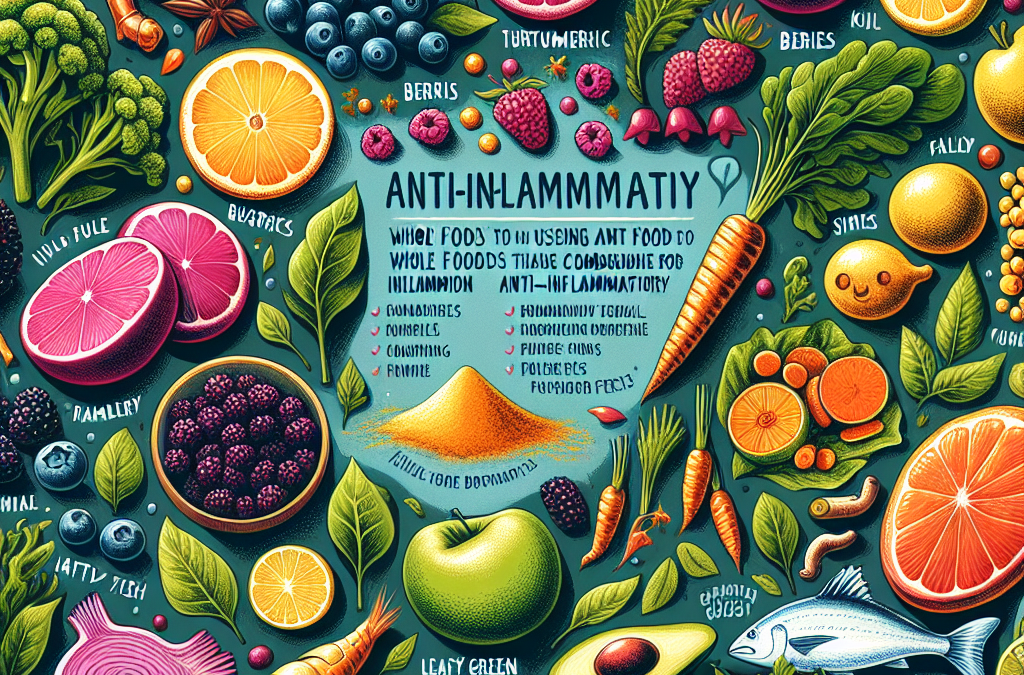Understanding Inflammation and Its Causes
What is Inflammation?
Inflammation is a natural response our body has to injury or infection. It’s like our body’s alarm system kicking in to help heal wounds and fight off invaders. But, here’s the catch: when inflammation becomes chronic, it’s like that alarm won’t stop ringing, leading us to a whole range of health issues from arthritis to heart disease.
This chronic inflammation can stem from various sources, including poor diet, stress, and lack of exercise. I like to think of it like your body’s way of saying “Hey, something’s not right, let’s fix this!” But, when “fixing” turns into “persistent,” we are in a bit of trouble.
That’s why understanding what triggers inflammation is crucial. By approaching it head-on, especially through what we eat, we can steer our bodies back toward a state of balance and health. And trust me, the journey starts right there on your plate!
Incorporating Omega-3 Fatty Acids
Why Omega-3s are Essential
Omega-3 fatty acids are like the superheroes of the fatty acid world. Found in foods such as fatty fish (think salmon and mackerel), walnuts, and flaxseeds, these bad boys have been shown to reduce the production of inflammatory substances in the body. They help to dampen inflammation while supporting overall health—what’s not to love?
In my experience, adding omega-3s to my meals wasn’t just a health decision, but a delicious one as well! Imagine a grilled salmon with a nice side of mashed avocado—it’s a meal that pleases both the taste buds and the body.
Whether through supplements or whole foods, ensuring you get enough omega-3s should definitely be on your radar if you’re looking to combat inflammation. It’s one thing to know about it, but another to truly embrace it in everyday meals!
Emphasizing a Plant-Based Diet
The Power of Fruits and Vegetables
It’s no secret that fruits and veggies are packed with antioxidants, vitamins, and minerals that help fight inflammation. Think of your plate as a colorful canvas. The more diverse the colors—red tomatoes, green leafy greens, yellow peppers—the better the nutrition you’re getting!
When I made a conscious effort to load my meals with a rainbow of plant-based foods, I noticed my energy levels soaring and my body feeling lighter. Whether it’s a smoothie packed with berries or a hearty vegetable stew, there’s a world of flavors that not only taste amazing but also support my health.
Plus, plant-based foods are often rich in fiber, which is great for your digestive system. A healthy gut can really play a role in reducing inflammation, giving you yet another reason to add those crunchy veggies to your plate.
Including Whole Grains in Your Diet
What are Whole Grains?
Whole grains, like brown rice, quinoa, and oats, are another fantastic way to combat inflammation. Unlike their refined counterparts, whole grains contain all parts of the grain, which means they’re packed with nutrients and fiber that help reduce inflammatory markers.
Get an Amazing Discount on the Best Certified Organic Whole Food Supplement!
I’m always on the lookout for ways to switch from white rice to quinoa or grab a bowl of hearty oatmeal in the morning instead of sugary cereals. Trust me when I say, the difference in how I feel is like night and day!
Mixing up your grains doesn’t just add variety; it can also stabilize blood sugar levels and contribute to better heart health. And let’s be real—it’s a win-win when healthy food tastes good too!
Spicing Things Up with Anti-Inflammatory Seasonings
Fantastic Spices to Include
When I say spices, I’m talking about flavorful powerhouses that can change your dishes and your health game. Turmeric, ginger, and garlic are three heavyweights in the anti-inflammatory arena. Turmeric, in particular, has curcumin, which has significant anti-inflammatory effects.
I’ve experimented a ton in the kitchen with spices! Adding a dash of turmeric to my smoothies and curries has not only made my meals taste incredible but has also transformed how I feel. Every sprinkle is an added layer of health benefits—plus, they smell amazing while cooking!
Incorporating these spices into your daily meals is a simple way to step up your health without much fuss. Just remember, a little goes a long way, and the flavors can blow your mind if you let them!
FAQs
1. What are anti-inflammatory whole foods?
Anti-inflammatory whole foods are natural foods that help reduce inflammation in the body. This includes fruits, vegetables, whole grains, lean proteins, and healthy fats, particularly from sources rich in omega-3 fatty acids.
2. How can I tell if I have chronic inflammation?
Chronic inflammation can manifest in various ways, including ongoing pain, fatigue, digestive issues, and skin problems. If you’re experiencing persistent health issues, it’s best to consult a healthcare professional.
3. Can I combat inflammation solely through diet?
While a healthy diet plays an important role in managing inflammation, it’s most effective when combined with other lifestyle changes such as regular exercise, stress management, and sufficient sleep.
4. Are there any foods I should avoid to reduce inflammation?
Yes! It’s generally a good idea to limit processed foods, sugar, trans fats, and refined carbohydrates as they can contribute to increased inflammation in the body.
5. Can I see improvements in inflammation quickly through diet?
Results can vary, but many people notice improvements in energy levels and discomfort within a few weeks of committing to an anti-inflammatory diet. Consistency is key in seeing longer-term changes!





